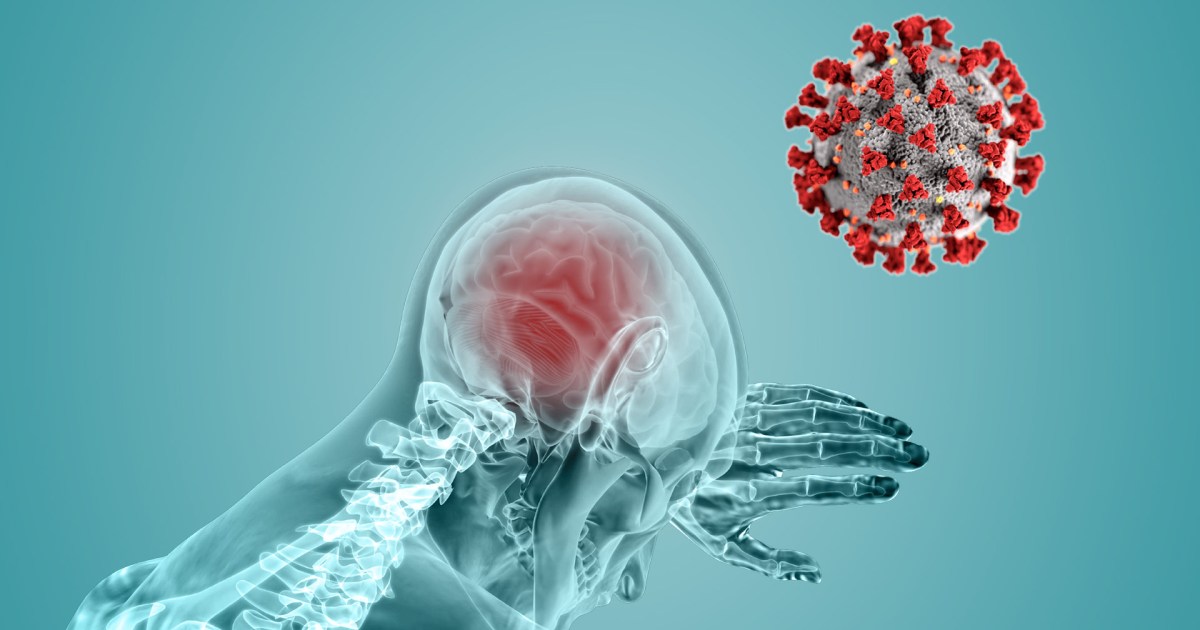Recent studies have arrived at new data on the emerging coronavirus, SARS Cove 2, which causes Covid-19 رض, including bad news about its dangerous effects on the brain, and good news about children.
Here we review the latest research data on the emerging corona virus:
the brain
A preliminary study of hospitalized patients from "Covid-19" found that this disease can harm the brain and cause complications such as strokes, infections, psychosis and dementia-like symptoms in some severe cases.
The researchers said that the results are the first detailed look at a group of neurological complications of "Covid-19", which confirms the necessity of conducting further studies to discover the mechanisms behind them and help in the search for treatments.
"This is an important glimpse of Covid-19 brain-related complications in patients who have received hospital treatment. It is extremely important that we continue to collect information to fully understand this virus," said Sarah Pete, a professor at the University College London, who co-led the study.
The study, published in the Lancet psychiatry journal on Thursday, detailed 125 cases from across the UK.
It is important to note that this study focused on severe cases, said researcher Benedict Michael of the University of Liverpool who co-led the study.
Data was collected between 2 and 26 April when the disease was spreading widely in the United Kingdom.
Strokes
The most common complications from the brain were strokes that were reported in 77 of 125 patients, most of whom were over the age of 60.
The blood clot in the brain interrupts the blood supply to a part of it, as a result of the blockage of one of the arteries leading to it.
When part of the brain’s supply to blood supply is stopped or decreased significantly, its supply of oxygen and nutrients is cut off, and in minutes the brain cells begin to die. Because the brain cells do not regenerate, this may lead to permanent brain damage.
The study also found that 39 out of 125 patients showed signs of disorder or behavior changes reflecting a shift in mental state. Of these, nine had nonspecific brain dysfunction and seven had brain inflammation.
Child mortality with Covid-19 is rare
We turn to good news, as an international European study confirmed that child mortality with Covid-19 is very rare, and occurs in less than 1% of cases, as the disease does not intensify in most of them.
This study, published in the specialized journal The Lancet Child and Adolescent Health, 82 health institutions, participated in this first European study dealing with children and adolescents (aged three days to less than 18 years).
The study, led by experts from Britain, Austria and Spain, showed that of the 582 patients included in the current study, only four died, all of them over 10 years old, two of whom originally had health problems.
This percentage is low compared to the percentage of adults suffering from diseases associated with the epidemic and who participated in previous studies, according to the researchers.
A small percentage of the children, but notably, were seriously ill, requiring treatment in intensive care (8% or 48 cases out of 582), noting that the study does not include mild cases that do not need help or a doctor.
In contrast, more than 90 children, or 16%, had no symptoms.
Reassuring results
The magazine noted that the true infant mortality rate is likely to be much lower than that observed in the study.
"Children who discovered additional respiratory viruses in addition to the Corona virus were more likely to enter intensive care," said Dr. Begonia Santiago Garcia of the Gregorio Maranion University Hospital in Madrid, who participated in the study. "This could have important implications in the coming winter when influenza infection becomes more common," she added.
The results are reassuring, said Mark Teebrugge of the Great Ormond Street Institute of Child Health in London College.
"The child mortality rate in this research was very low, and it should have been much lower, because many children with mild illness did not attract the attention of the doctor and therefore were not included in this study," he said.
Mosquitoes do not transmit the "Covid-19" epidemic
We conclude with more good news, with a study published by the Italian National Institute of Health Thursday that showed that mosquitoes do not transmit the emerging Corona virus.
The World Health Organization has previously stated that there is no evidence that the epidemic can be transmitted by these insects, which are capable of transmitting malaria, dengue or other diseases when humans bite.
But the latest study, conducted in cooperation with the Institute for Experimental Animal Medicine in Venice (AZFA), showed that Asian tiger or common mosquitoes do not transmit Covid-19.
The institute said in a statement that the tests showed that "the virus that is transmitted to mosquitoes by injecting them with blood carrying the epidemic has not multiplied," so it is impossible for insects to transmit the virus through their bites.

